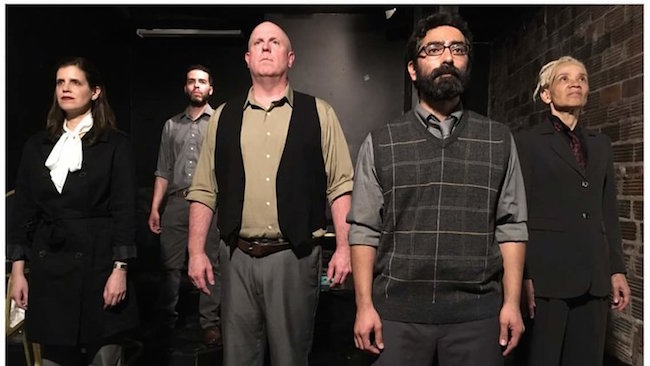Theater Review: “The Plague” — A Necessary Moral Parable
In a culture that seems hell-bent on distracting us from painful realities, the intimacy of this production comes off as redemptive and inspiring.
The Plague, the novel by Albert Camus, adapted for the stage by Neil Bartlett. Directed by Daniel Boudreau. Staged by Praxis Stage at the Dorchester Art Project, 1486 Dorchester Ave, Boston, MA, through May 20 and at Boston Playwrights’ Theatre 949 Commonwealth ave, Boston, MA, May 23 through 27.

The cast of the Praxis Stage production of “The Plague.”
By Matt Hanson
When it comes to the challenges posted by the 21st century history, Albert Camus is proving to be among the essential guides from the 20th. The French writer might be best known to mopey collegians for 1942’s The Stranger but, for my money, his magnum opus is his 1947 novel The Plague. Set in the Algerian city of Oran, which has become infested with virus-carrying rats, the novel chronicles the city’s reaction to its steadily worsening conditions, particularly the struggle of ordinary people to survive. Camus is justly famous for his existential meditations on what he termed “the Absurd”; the narrative explores the ways in which humans deal with inexplicable catastrophe. The metaphor was potent during and after WWII (Jean-Paul Sartre made use of it in his 1943 update of a Greek tragedy, The Flies), and the concept of a plague as a test for civilization (or a punishment for its shortcomings) feels amazingly contemporary. Today, we are surrounded by unmediated disasters of all kinds, whether they be environmental, social, political, or some combination thereof.
Playwright Neil Bartlett has adapted the novel for the stage, turning it into an elemental play for five voices via a tightly constructed minimalist theater experience. (The Arts Fuse talked with Bartlett about his approach.)
Director Daniel Boudreau, Praxis’ founder, knows how to get the most from the stripped-down set design. Five actors on a nearly bare stage take turns reciting the dialogue — individual speeches alternate with collective, chorus-like reflections on the general. The effect is raw, immediate, and immersive. The narrative’s power, the story of how individuals, as well as civilization itself, are threatened by the plague, is enhanced because audience members are addressed by actors who are almost at eye-level. Instead of observing the horrific unraveling of the city from a complacent distance, viewers are drawn into the action: not only by the language, but through the proximity of bodies in crisis.
The hero of the story is Dr Rieux, whose medical expertise and devoted effort to alleviate suffering is pushed to the limit. In an inspired casting choice, Rieux isn’t the novel’s Camus-resembling male but an African-American woman, played with moving dignity by Dayenne Walters. Camus’ Oran isn’t just a city with health concerns; it’s also a turbulently diverse place with crackling racial tensions, a decades-old urban flashpoint for colonial conflict. Camus saw both sides of the Algerian question and brooded on the violence coming from each direction. In the play and the novel, Rieux is a potent symbol of rationality and compassion in an absurd world; Walters conveys the potent stoicism of one of the few figures of authority left as the plague deepens, inexorably changing every facet of daily life.
The play depends on the cast narrating Camus’s events effectively, and that poses a some dramaturgical risk. Relying on the performers to dramatize the specifics of scene and situation, without the means of props or set design, can easily fall flat, turning the evening into ‘storytelling theater.’ Praxis’s production clears this hurdle elegantly and evocatively. Camus was known for his philosophical depth and moral commitment, but he was also one of the rare philosophers who could write powerful fiction. He had a poet’s eye for atmosphere and detail, and Bartlett’s adaptation infuses the rich imagery of the source text into a different medium. As the story unfolds, the actors take on specific roles, but somehow manage to convey the sense of a community under siege by deftly switching focus, jumping from descriptions of the roiling city to detailing specific human dramas within the chaos.
Each character represents a different aspect of the city’s degeneration. A journalist desperately wants to leave the quarantined city to see his beloved and must figure out how to bribe his way free through the means of the black market. Mr Cottard, played with cynical aplomb by Steve Auger, makes a profit from running illegal businesses. People’s reactions vary wildly as the reassuring comforts of the everyday disappear and life gradually becomes more urgent and tragic. This is where the script’s minimalist staging works especially well; the proximity of the actors to the audience increases the production’s dramatic intensity. It becomes difficult to look away from a character’s suffering. In a culture that seems hell-bent on distracting us from painful realities, the intimacy of this production comes off as redemptive and inspiring.
And it is this optimism that accounts for the play’s unexpected emotional breakthrough. The Plague certainly isn’t a laugh riot, but its dark subject matter doesn’t revel in bleakness for its own sake. As Bartlett’s script understands, and Boudreau’s direction makes clear, Camus didn’t fetishize ruin and despair, but celebrated hope. Having honorably survived and resisted the Nazi occupation of France, as well as the daily terror of France’s occupation of Algeria, Camus knew confronting the darkness of the human condition wasn’t enough — one also had to push against it. The Plague is about a ‘real’ plague, but it’s also a gripping moral parable about how human beings struggle to endure plagues of all kinds.
Matt Hanson is a critic for The Arts Fuse living outside Boston. His writing has appeared in The Millions, 3QuarksDaily, and Flak Magazine (RIP), where he was a staff writer. He blogs about movies and culture for LoveMoneyClothes. His poetry chapbook was published by Rhinologic Press.
Tagged: Albert Camus, Daniel Boudreau, Matt Hanson, Neil Bartlett, Praxis Stage
